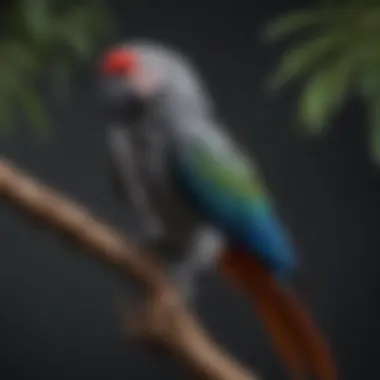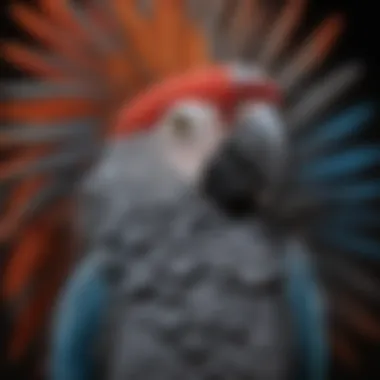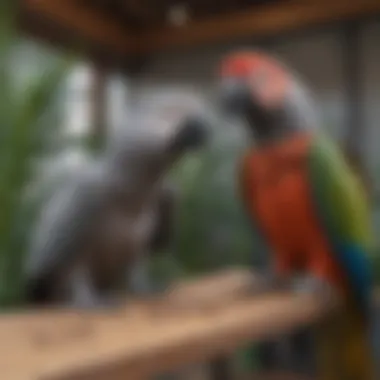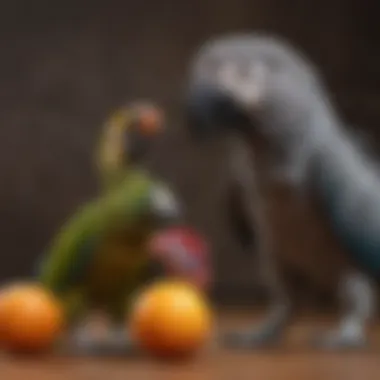Understanding the African Grey Macaw: Care and Insights


Intro
The African Grey Macaw, renowned for its intelligence and complex personality, has captivated many potential pet owners. Understanding this remarkable species is crucial for successfully navigating ownership. This guide offers an in-depth exploration of the African Grey Macaw, shedding light on its care requirements, behavioral tendencies, nutritional needs, wellness considerations, and enriching activities. With the right information, prospective owners can ensure that their experience with this bird is fulfilling and enriching for both the pet and the owner.
Care Tips
Daily Care Routines
The daily care of an African Grey Macaw involves a structured routine to ensure their physical and mental well-being. Each day, the bird should be allowed several hours outside of its cage to exercise and socialize. During this time, activities can include interactive play with safe toys or even basic training exercises. Ensure they have access to fresh water and a balanced diet at all times. A habbit in cleaning their living environment daily is crucial too to avoid any buildup of debris or waste.
Cage Setup and Maintenance
When setting up a cage for an African Grey Macaw, consider the size. A large cage with horizontal bars is ideal to allow for climbing and exercise. Include perches of various diameters, which help to promote foot health. Regular maintenance is essential; clean the cage weekly, replacing worn toys and relevant accessories.
Hygiene and Cleaning Practices
Proper hygiene is vital. The cage should be washed with a bird-safe cleaner regularly. Additionally, sheet placement at the bottom helps ease cleaning. Bird baths or misting can be part of their routine to aid in feather maintenance.
Seasonal Care Adjustments
As seasons change, adjustments may be necessary. During winter, ensure that the environment is free from drafts and maintain a comfortable temperature. In warm months, provide plenty of water and monitor for potential overheating.
Behavioral Insights
Understanding Bird Body Language
Recognizing body language is key in understanding African Greys. Their feathers can puff up, indicating relaxation or discomfort. Practicing observation leads to better communication and bonding over time.
Common Behavioral Issues and Solutions
Behavioral issues can arise, such as excessive screaming or biting. Commonly, these behaviors indicate boredom or frustration. Providing ample toys and interaction is vital. Redirecting unwanted behavior with calm correction amplifies understanding.
Positive Reinforcement Techniques
This species reacts favorably to positive reinforcement. Reward desired behavior with treats or praise. This method increases compliance and strengthens behavior.
Social Interaction Needs
African Grey Macaws thrive on social interaction. Lack of it can lead to loneliness or stress. Engage daily with your bird to fulfill its natural need for companionship.
Nutrition Guides
Essential Diet Components
The diet of an African Grey should include high-quality pellets, fresh fruits, and vegetables. Seeds should be reserved as occasional treats due to their high-fat content.
Safe and Toxic Foods
It is important to distinguish between safe and toxic food. Safe options include apples and carrots, while chocolate and caffeine must be avoided at all costs.
Supplements and Treats
Supplements may be beneficial depending on the individual bird's needs. Calcium might be critical, particularly for breeding birds or youngsters. Always choose supplements after consulting a vet experienced in avian care.
Feeding Strategies for Different Species
Each bird may have unique needs based on its age and health. Adjust feeding strategies accordingly. Offering food in multiple locations can encourage foraging behavior, greatly improving welfare.
Wellness and Health
Routine Health Checkups
Routine checkups are a priority. Consult a veterinarian experience with birds annually or more if noted changes in behaviors arise. Early detection is critical in care planning.
Identifying Symptoms of Illness
Tip-offs to potential issues include feather picking, lethargy, or loss of appetite. Monitoring your bird carefully helps in identifying health problems sooner rather than later.
Preventative Care and Vaccinations
Vaccinations against common avian diseases are essential in preventative care. Discuss necessary vaccines with your vet during annual check-ups.


Mental and Emotional Well-being
Mental stimulation is as important as physical care. These birds can experience depression, thus including varied games aids in continuation of positive mental health.
Enriching Activities
Toys and Playtime Ideas
Provide stimulating toys intended for chewing and intelligence-based tasks. Rotate them weekly to sustain interest.
Training and Tricks
Engaging your bird with simple commands and fun tricks keep them mentally connected. Regular sessions helps build trust between the pet and owner.
Outdoor Activities and Interaction
Ensure safety while exploring new environments. Leashed walks in secure locations bolster confidence and introduces them to new sights and sounds.
DIY Projects for Mental Stimulation
Crafting your own toys provides enrichment without considerable expense. Common supplies like paper and twine are excellent for safe bird playtime.
The African Grey Macaw, with time and patience, rewards its owner with a bond not easily broken. Consistent care and diligent observation yield a relationship based on trust and affection.
In sum, owning an African Grey Macaw entails a significant commitment. Understanding their needs holistically prepares potential owners for a fulfilling ownership experience.
Intro to African Grey Macaws
African Grey Macaws are more than just beautiful pets; they embody a blend of intelligence and sociability that can enrich the life of any bird owner. Understanding these magnificent creatures is essential for anyone contemplating adding one to their family. Knowledge about their needs, traits, and habits aids potential owners in making informed decisions. This section introduces the importance of understanding the African Grey Macaw, emphasizing unique aspects of their lifestyle, care necessities, and the joy they can bring.
Overview of the Species
The African Grey Macaw, most recognized for its outstanding vocal abilities, is frequently hailed as one of the most intelligent parrot species. They usually measure around twelve to thirteen inches in length and weigh between 12 to 16 ounces. Their societies in the wild are organized, demonstrating behavioral complexities rarely seen in other bird species.
With two main species, the Congo and Timneh African Grey Macaw, varying in size and coloration, each has distinctive traits. The Congo African Grey features a striking black bill and bright red tail feathers. The Timneh tends to have darker plumage and a maroon tail. These variations show the adaptability and appeal of the species, making them uniquely captivating as pets.
Understanding their needs as highly social creatures is key. African Grey Macaws, when kept in isolation, may develop harmful behavioral issues due to lack of social interaction. They thrive around humans or other birds.
Origins and Habitat
The native habitat of African Grey Macaws primarily spans tropical forests and woodlands in Central and West Africa. Countries such as Ivory Coast, Cameroon, and the Democratic Republic of the Congo house significant wild populations. These birds prefer areas near wetlands and rivers, emphasizing their need for abundant food and accessible water sources.
In the wild, they feed on various fruits, nuts, and seeds—important elements tailored to their diet. Unfortunately, habitat destruction due to logging and agricultural expansion endangers their populations, which raises significant conservation concerns. Awareness of their origins helps potential owners appreciate the environment from which their pet comes, fostering how better to replicate its needs in captivity.
Understanding African Grey Macaws demands respect not only for their impressive intellect and vibrant personality but also their conservation requirements. Nesting, feeding, and social structures in the wild are complex. Grasping these complexities increases the likelihood of providing an appropriate home for a lifelong commitment.
Physical Characteristics
Understanding the physical characteristics of the African Grey Macaw is vital for potential owners. It is not just about aesthetic appeal. These features affect care requirements, behavior, and overall wellbeing. Recognizing the size, weight, coloration, and distinctive feather formations helps in creating an environment that supports their health and happiness. This section delves into the specifics of size and color to prime prospective owners for a suitable ownership experience.
Size and Weight
The African Grey Macaw is a medium to large bird. On average, they attain a length ranging from 12 to 14 inches, making them one of the notable parrots for both social interaction and companionship. They usually weigh between 12 to 16 ounces. The sheer size of these birds means that their habitats and care requirements must consider this growing mass. Available space in a home is critical.
Larger cages help foster healthy sociology and allow playfulness, which is inherent in their behavior. Furthermore, weight also has implications for their diet; it influences how much they eat and the type of nutrition they require. Monitoring their weight is key for assessing health and vet visits become crucial in case of any sudden changes.
Coloration and Feathers
Coloration in African Grey Macaws is another attractive and practical consideration. Their feathers are predominantly grey, with striking splashes of red and/or yellow on the tail. Not only do these feathers serve an aesthetic role, but they are also indicators of health and vitality. Vibrant feather colors typically signal a well-nourished and healthy bird.
Care routines need to encompass feather maintenance attention as the little ones will experience molting. During these periods, the birds shed old feathers for new ones, and it is essential to monitor the conditions under which this happens.
Both coloration and the condition of feathers give insights into the bird's nutrition and environment. Owners must understand how poor diet or negligence can lead to dull colors or feather loss. Thus, photography and active observation become efficient hobby apps when assessing their overall emotional state.
Key Takeaway: Understanding the physical traits of the African Grey Macaw brings a deeper insight into their needs and wellbeing as pets. Proper preparations based on size and maintenance will lead to a fulfilling ownership experience.
Temperament and Behavior
Understanding the temperament and behavior of African Grey Macaws is key for anyone considering these birds as pets. Their unique personalities and nature affect how owners must interacts with them. African Grey Macaws are known for their intelligence and ability to form deep connections with their caretakers. Recognizing these traits can aid in developing a successful owner-bird relationship. Proper attention to their behavioral needs can lead to a more harmonious household.
Social Needs
African Grey Macaws thrive in social environments. They are not solitary birds; rather, they seek companionship. This is important because when establishing a bond, the macaw needs regular interaction. Owners can engage with their birds through conversation, training exercises, or simple play.


Socialization also extends beyond human interaction. If possible, having another bird as a companion can mitigate loneliness. Buddy birds need careful introductions, though. Every macaw has its own unique personality. Many will enjoy being an integral part of family life by participating in shared activities. A simple play session or feeling part of daily routines strengthens their emotional health.
Benefits of Social Interaction
- Improved Behavior: Sufficient interaction disminuir problematic behaviors.
- Enhanced Intelligence: Many stimulation activities sharpen cognitive skills.
- Emotional Support: Affectionate bonds mitigate anxiety in both bird and owner.
Social needs can be challenging but rewarding. Understanding and fulfilling these social requirements positively transforms the ownership experience.
Cognitive Abilities
The intelligence of African Grey Macaws cannot be overstated. These birds are often described as one of the smartest avian species. Their ability to learn new skills makes mental stimulation essential. Intelligent birds will quickly grow bored. Therefore, their care requires ongoing learning opportunities.
Training is a proactive activity for enhancing cognitive skills. Basic commands can be introduced early, and consistent practice is key. Macaws not only learn certain behaviors but also random words or phrases. Their vocal abilities make it easier to find joy in their company.
Ways to Enhance Cognitive Abilities
- Puzzle Toys: Engaging toys encourage problem-solving.
- Training Sessions: Regular sessions for tricks reinforce learning.
- Interacting Using Technology: Gentle audio or visual stimuli provides stimulation.
Many owners find joy in teaching and interacting, creating a deeper bond to their feathery companions.
When understood correctly, the cognitive abilities of African Grey Macaws pave the path to rich interactions that enhance both lives, promoting personal happiness during ownership.
Legal Considerations
Understanding the legal parameters that govern the ownership of an African Grey Macaw is crucial for potential owners. These regulations impact everything from where you can buy your bird to how to care for it legally. Owning a parrot not only requires dedication to its well-being but also adherence to legal standards.
Regulations on Ownership
When considering an African Grey Macaw, it is essential to understand that if you live in certain regions, ownership laws may vary. In some jurisdictions, these birds might be classified as exotic pets, which could lead to strict licensing regulations or even prohibits owning them altogether.
- Local Regulations: Research local laws that may restrict possession of specific exotic pets.
- Licensing Requirements: Some places may require owners to obtain a special permit before acquiring an African Grey Macaw.
- Endangered Species: As African Grey Macaws are listed under the Convention on International Trade in Endangered Species of Wild Fauna and Flora (CITES), it's important to confirm that your bird is sourced legally.
Potential owners must familiarize themselves with these laws to avoid the possibility of fines or the animal being taken away. Finding accurate, up-to-date information from law enforcement agencies or local wildlife organizations can help prevent future complications.
Buying from Reputable Sources
The path you choose to get an African Grey Macaw should not be taken lightly. Purchasing from a reliable source is as important as understanding regulations. A reputable breeder or rescue organization provides assurances about the background and health of the bird.
Here’s what to look for:
- Knowledgeable Breeders: Ensure the breeder has a good reputation and can provide health clearances.
- Documentation: Authenticity of breeding certificates and health records go a long way.
- Visitor Opportunities: A credibility indicator is whether you are allowed to visit the breeding facility or rescue home, meeting the parent birds or the conditions in which the birds are raised.
Cost of Ownership
Understanding the costs associated with owning an African Grey Macaw is crucial for potential owners. This not only includes the initial financial outlay but continuous investment throughout the bird's life. Budgeting well before often leads to better care and happiness for both the owner and the macaw.
Initial Purchase Price
The initial purchase price of an African Grey Macaw usually varies based on factors like age, color mutation, and breeder reputation. It generally ranges from $1,000 to $3,000. Purchasing a bird from a reputable breeder is essential, as this can ensure the macaw’s health and quality. It is important to find sources that provide documentation of health screenings or any lineage, ensuring you invest your money wisely.
Ongoing Expenses
Once you bring your African Grey Macaw home, the costs do not stop there. It is crucial to consider ongoing expenses such as:
- Diet and Nutrition: This species has specific dietary needs, requiring high-quality pellets, fresh fruits, and vegetables. Expect to spend $30 to $60 monthly.
- Veterinary Care: Annual check-ups and occasional emergencies can cost anywhere from $200 to $500 yearly. Vaccinations and routine tests are also factors to consider.
- Breeding Supplies: Perch, cage accessories, toys, and enrichment items add to the costs. These can sum up to $200 annually.
- Insurance and Licensing: Depending on location, a license might be needed and often costs $20 to $100. Additionally, some choose to insure their birds, which could lead to further expenses.
By understanding both initial and ongoing costs, potential owners can make informed decisions about bringing an African Grey Macaw into their homes. Ultimately, being financially prepared and maintaining consistent care leads to a cherished companionship with this intelligent species.
“Responsible ownership extends beyond initial purchase; it encompasses a commitment to financial stability for the entire lifecycle of your pet.”
Care Requirements
Caring for an African Grey Macaw is a serious commitment that requires knowledge and attention to detail. The Care Requirements section of this article serves to emphasize the essential elements of caring for these birds. This comprehensive guide will cover vital aspects like diet, housing, and health, all crucial for ensuring the well-being of your pet.
Diet and Nutrition
Proper diet and nutrition is vital for the health of African Grey Macaws. These birds require a balanced diet that includes a variety of foods.
- Pellets: Premium quality pellets formulated specifically for African Greys should form a primary part of their diet because this ensures they get necessary vitamins and minerals.
- Fruits and Vegetables: Fresh fruits and vegetables should be offered daily. Foods such as apple slices, carrots, and broccoli can stimulate interest and provide necessary nutrients.
- Seeds and Nuts: While seeds and nuts can be treat items, they should make up a small proportion of an African Grey's overall diet due to their high-fat content.
It is essential to avoid feeding them avocado, chocolate, or caffeinated beverages, as these can be toxic. Regular monitoring of their weight and feathers can also reveal signs of nutritional deficits, helping owners to adjust diets accordingly.
Housing and Environment


Creating the suitable housing and environment for an African Grey Macaw can greatly enhance its quality of life. The cage should be spacious enough to allow for comfortable movement. Factors to consider include:
- Cage Size: A large cage minimizes stress and encourages exercise. Ideally, the cage should allow for wingspan extension and climbing.
- ** Cage Material and Design**: Choose a sturdy, chew-proof design. Bars should be spaced correctly to prevent escape or keeping feet trapped.
- Enrichment: Providing toys helps prevent boredom. Rotate toys and add new items to keep the bird engaged.
The location of the cage also matters. Place it in a lively area where the family spends time. Macaws thrive when they feel included in daily activities. Moreover, ensure the environment is safe—avoid placing it near drafts or sunlight directly.
Health and Veterinary Care
Monitoring an African Grey's health is crucial for long-term well-being. Regular veterinary check-ups should be part of the care plan. Here are crucial considerations:
- Veterinary Visits: Schedule annual check-ups with an avian vet who specializes in birds. Regular exams will help catch problems early.
- Vaccinations and Testing: Depending on the region, certain vaccinations and health tests might be recommended to protect your bird's health.
- Signs of Illness: Educate yourself about potential health issues, such as feather plucking or lethargy. Be ready to seek medical attention if you notice anything unusual in behavior or appearance.
Providing optimal care supports not only the health of your African Grey, but forms a strong bond between the pet and owner, enhancing general companionship experience in your home.
In summary, understanding the Care Requirements for an African Grey Macaw involves detailed attention to diet, environment, and health. These aspects are fundamental in fostering a nurturing habitat that allows these intelligent birds to thrive.
Training and Enrichment
Training and enrichment are critical components in caring for African Grey Macaws. These elements not only enhance the bond between the bird and its owner but also help to prevent and address behavioral problems that can arise if intellectual needs are not satisfied. Understanding the significance of providing proper training and engaging activities can lead to a more harmonious and fulfilling environment for both the bird and its owner.
Basics of Training
Training an African Grey Macaw involves consistent approaches tailored to their natural behavior and intelligence. Maria demonstrating it's essential to start training early, laying the foundation for effective communication and social interaction. Establishing a routine helps the bird understand what is expected. Patience and understanding are equally important.
It is beneficial to use positive reinforcement techniques rather than punishment. This kind of training embraces rewards, such as treats or verbal praise, when desired behaviors are displayed. Not only does this encourage repetition of those behaviors, but it also fosters an atmosphere of trust. Here are some basic training strategies:
- Simple Commands: Start with commands like
Common Challenges and Solutions
African Grey Macaws are remarkable birds, but owning one comes with its own set of challenges. Understanding these challenges early can significantly improve not just the owners' experience but also the quality of life for the bird. This section discusses behavioral issues and health concerns, supplying potential owners with solutins and a clearer understanding of these aspects.
Behavioral Issues
Behavioral issues are among the most common challenges Macaw owners face. These birds are highly intelligent and require mental stimulation. Boredom can lead to unwanted behavior like feather plucking or excessive noise. Recognizing the signs early is crucial.
Potential owners should consider the following strategies to mitigate these issues:
- Mental Stimulation: Provide toys suitable for their strong beaks. Rotate toys frequently to maintain interest.
- Social Interaction: African Grey Macaws are social creatures. Daily interaction helps reduce anxiety-related behaviors.
- Training: Teaching commands through positive reinforcement can minimize unwanted behaviors and strengthen your bond.
- Routine: Establishing a daily routine can help Macaws feel secure, potentially reducing anxiety.
If behavioral issues arise, consulting an animal behaviorist who specializes in birds can guarantee a well-informed approach.
Health Concerns
Health is a critical aspect of successful African Grey Macaw ownership. These birds are prone to specific health issues that require diligent care and attention. Owners should be aware of common health concerns and how to manage them.
Some common health issues include:
- Nutritional Deficiencies: Providing a balanced, varied diet is essential. Lack of certain vitamins can lead to various health problems.
- Obesity: African Greys can become overweight if fed inappropriate diets. Regular vet check-ups can help track weight.
- Respiratory Issues: Home environments with poor air quality may pose risks. Ensure good ventilation and avoid exposure to harmful chemicals.
Annual veterinary visits should not be overlooked. Regular check-ups can catch health issues before they become serious.
Remember: Early identification and intervention may profoundly impact your bird's overall quality of life.
End: Making the Right Choice
Deciding to welcome an African Grey Macaw into your home is not a decision to be made lightly. This remarkable species has distinct needs and capabilities that require in-depth understanding and commitment. A thorough exploration of this article has provided insights into various aspects of owning an African Grey Macaw.
First, it is crucial for individuals to truly assess their readiness for such a commitment. Assessing factors like lifestyle, financial stability, and personal comfort with birds is essential. This bird's high intelligence demands mental and social engagement, so understanding that need is paramount.
Assessing Your Readiness
When considering an African Grey Macaw, honest self-evaluation is a necessary first step. Here are a few critical aspects to ponder:
- Time Commitment: African Greys require significant interaction time. Evaluate how much time daily you can devote.
- Living Space: Do you have sufficient space for a spacious cage that allows flight and exploration?
- Financial Responsibility: Ownership extends beyond the purchase price. Can you consistently support long-term care, vet visits, and ongoing supplies?
Each of these elements plays an important role. Owners often underestimate the scope of care needed.
Long-term Commitment
Owning an African Grey Macaw is a decade-long or longer commitment. This species typically has a lifespan of around 40 to 60 years, sometimes reaching beyond. Therefore, it's vital to agree on long-term solutions.
Creating a detailed plan for the future is wise. Factors include potential moves, changes in family dynamics, or lifestyle adjustments that may occur over the years. Here are some considerations:
- Support System: Establish what support exists for the bird in circumstances of emergencies.
- Future Mobility: Plan for possible relocations that would allow the bird to adjust
- Longevity in Care: Evaluate whether any nearby options for vet care will remain consistent during ownership.
Success in ownership lies not only in the initial choice to adopt but in embracing the responsibilities and adapting to new realities that may emerge, ensuring a rich and fulfilling experience with one of nature’s most cognitive companions.
Owning an African Grey Macaw is a partnership that thrives on mutual respect, understanding needs, and committing to a lifetime journey.















